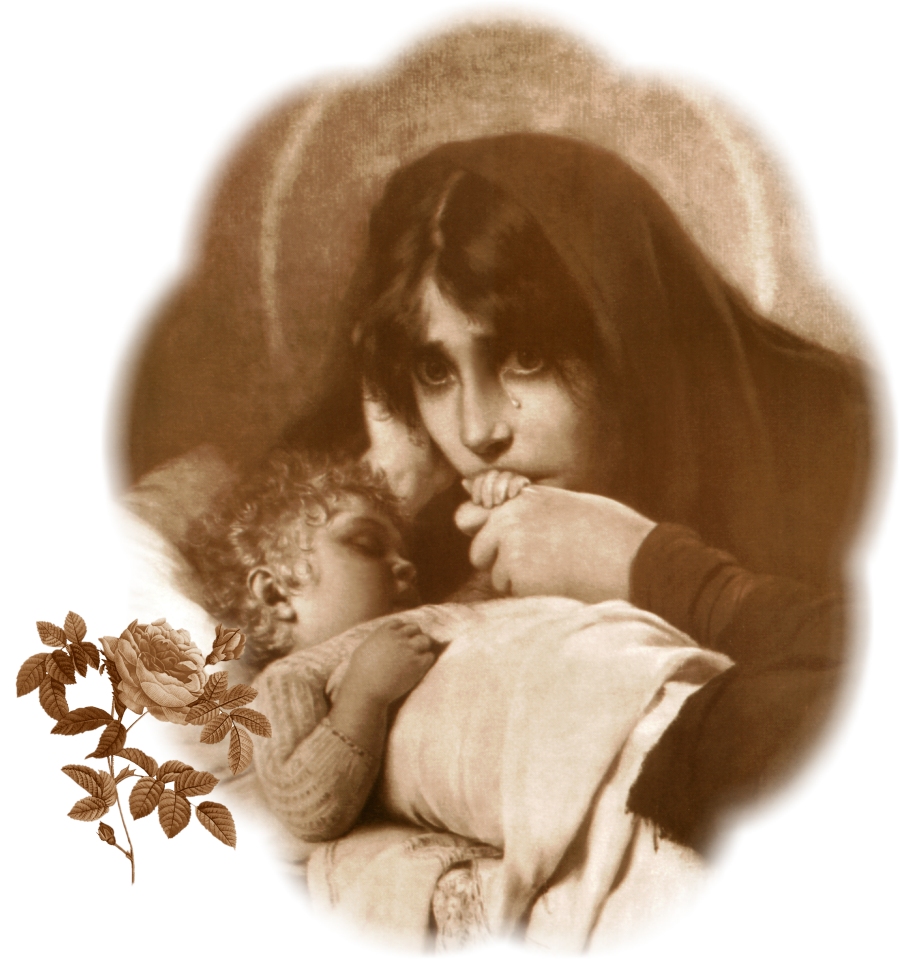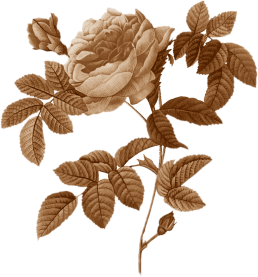
ABOUT DEVOTION
TO THE
MOTHER
OF SORROWS
"That
in all things God may be glorified."
Holy Rule of St. Benedict.
Nihil
Obstat: Gulielmus J. Blacet, J.C.L. Censor Librorum
Imprimatur
+ Joannes P. Cody, S.T.D. Episcopus Kansanopolitana-Sti. Josephi
March
10, 1951
Mary's
Suffering Proportioned to Her Sanctity
As Mother of God, Mary
was exalted to an incomparable height of holiness. Who can comprehend
the
lofty height of her greatness or fathom the abyss of her sanctity? St.
Thomas attempted, and concluded that omnipotence itself could not
invent
a "greater greatness." It was necessary that her sorrows should
correspond
to her holiness, for the sufferings and tribulations of the Saints
always
keep apace with their sanctity. What then must Mary's sufferings have
been
in order to be proportionate to her greatness ---- the
greatness of the Mother of God! Who can comprehend the immensity of her
graces and merits, and consequently the enormous weight of sufferings
required
by such holiness, to complete her perfection, to crown her most
condignly?
The sorrows of the Mother
of God surpassed the power of human endurance. It is the unanimous
opinion
of spiritual writers that beneath the pressure of her inconceivable
sufferings,
the Blessed Virgin's life was miraculously preserved. From the moment
of
Simeon's prophecy she foresaw her sorrows in vivid reality. Without the
special aid of God's omnipotence, her soul would have been separated
from
her body.
True, Mary was marvelously
tranquil, because she was wholly submissive to the will of God; but
this
did not lessen her sorrows. Her nature, never disturbed by sin,
possessed
an extraordinary tenderness and was susceptible to suffering in an
inexpressibly
high degree. "Men will never comprehend the anguish of my sorrows!" she
revealed to St. Bridget.
 The picture of Mary
bowed down with sorrow on Calvary teaches us that pain is the twin
sister
of love on earth. The picture of Mary
bowed down with sorrow on Calvary teaches us that pain is the twin
sister
of love on earth.
Circumstances
Which Increased Her Sufferings
We can gain some idea
of the immensity of the dolors of our Blessed Mother by considering the
conditions that imparted special bitterness to her sufferings. Placed
in
similar circumstances with the Blessed Virgin Mary, what mother would
not
have longed to die with her son? But Mary could not die with Jesus,
although
union
with Him had become so much a part of her nature that it actually
constituted
her life. Jesus, her Son, was the bliss of her heart, the sun of her
existence.
How could Mary live without Jesus! Still, she must see Him die, without
being able to die with Him! What inexpressible grief!
Another circumstance
that in- creased the anguish of the Mother of God was the realization
that
her sufferings increased those of her Divine Son; that these were, in
fact,
some of the bitterest pangs He had to endure. It was His will that His
Blessed Mother should form. a part of His sufferings. When we consider
the boundless love with which He loved His Mother, we will understand
that
to meet her on His way to Calvary, to behold her beneath the Cross, was
truly one of His most acute tortures. Mary knew this. What pain for her
maternal heart to know that she must be one of the causes of His
sufferings!
Again, Mary was an eye-witness
of the sufferings of her Divine Son. She saw Him bound to the pillar;
she
heard the lashing of the scourges, she saw His delicate virginal flesh
writhe and quiver under the lacerating blows. She was present at the
Ecce
Homo scene, on the way to Calvary, and at the Crucifixion. And her
anguish
was further increased by the fact that she could offer no relief to her
dear Son in His excruciating pains. As she stood beneath the Cross, she
saw the Blood trickling from His thorn-crowned Head into His eyes, but
could not reach His sacred Face to wipe the drops away! She saw His
lips
parched with thirst, pale and bloodless, but was unable to give Him a
refreshing
drink! His head had no pillow to rest upon, yet she was prevented from
supporting it or letting it repose upon her bosom. Who can comprehend
the
anguish endured by her Mother-heart during those three endless hours of
dreadful helplessness!
As the Blessed Virgin
stood beneath the Cross, there was still another source of most bitter
sorrow for her, namely, her clear conception of the nature of sin. We
may
not doubt that Our Lord imparted to His Mother a supernatural knowledge
of sin, its wickedness, its hideousness, and the borrow and hatred that
God entertains for it. The hideousness of sin she beheld written on the
Cross in the Precious Blood of Jesus. She saw the sins of the whole
world,
like a mountain, pressing upon the bowed shoulders of her bleeding,
dying
Son. She saw that He was truly God, thus crushed by the numberless sins
of man, covered with their guilt, crucified by their malice! What
unspeakable
suffering for the sinless, guiltless, Immaculate Heart of our sweet
Mother!
Another source of Mary's
unutterable grief was man's ingratitude for Our Lord's Passion, and the
eternal perdition of so many souls for whom her Son's Precious Blood
would
be shed in vain. She, the Queen of the Apostles, the Mother of the
Church,
saw passing before her eyes a vision of the heedlessness of mankind for
sins forgiven, the relapses into mortal sin, the amazing, frightful
multitude
of venial sins, the cold indifference, the disgust for Divine things,
the
desecration of the holy sacraments, the rejection and abuse of grace on
the part of so many souls ---- all, consequences of
the basest ingratitude.
Now with the eyes of
her soul she saw the multitude of the damned, for whom all the
sufferings
of her Son would be lost. At this sight, what indescribable pain must
have
pierced to its very depths the most loving heart of our dearest Mother!
Mary's
Sorrows Merit Our Grateful Veneration
The sufferings of Mary
at the death of her Divine Son rent her heart. Our Lord therefore said
to St. Mechtilde: "Greet the heart of My Mother as the most patient of
hearts; for it was pierced by thousands of swords, both during My
Passion
and Death, and afterwards when she remembered these dreadful torments."
For fifteen years after
the death of her beloved Son, until her own happy departure, the
Passion
of Our Lord was renewed over and over again in the heart of the Blessed
Virgin. It was revealed to Mary of Agreda that after the ascension of
her
Son, Mary suffered inexpressibly every Friday, as do certain privileged
souls who are favored with the stigmata. All these sufferings Mary
endured
for love of us.
Special
Lovers of Mary Sorrowful
Many Saints
have cherished a special love for Mary as the Mother of Sorrows. Saint
Ignatius Loyola constantly wore an image of the Sorrowful Mother on his
bosom, and venerated her with tender devotion.
Blessed Henry
Susso, who cherished a most tender compassion for the Dolorous Mother
and
meditated often on her sorrows, received wonderful revelations from her
own lips. Mary said, among other things: "Consider that all the grief
ever
endured by a human heart would be as a drop of water to the vast ocean
compared to the fathomless grief and anguish that my maternal heart
endured
at the foot of the Cross!"
Saint Alphonsus
Liguori made the sorrows of Mary the subject of his daily meditations
and
his deepest compassion. When he conducted a mission he usually placed a
picture of the Sorrowful Mother beside the pulpit, so that the
faithful,
by gazing upon it, might devoutly reflect on Mary's sufferings and be
encouraged
to confide in her merciful intercession. During his sermons he often
invoked
the Mother of Sorrows and exhorted sinners to turn to her to obtain the
grace of sincere conversion. Among his writings are several treatises
on
the sorrows of Mary.
The Saintly
Pope Pius IX nourished a deep devotion to the bitter sufferings of our
Savior and those of His Sorrowful Mother. The frequent remembrance of
Our
Lord and His Mother in their sorrows and sufferings seemed to him an
efficacious
means of converting sinners, affording them a lasting incentive to
contrition,
penance and amendment. Therefore [in 1847] he approved a new "Hail
Mary"
composed in honor of the Dolorous Mother. The prayer is as follows:
"Hail Mary,
full of sorrows, the Crucified is with thee; thou art pitiable amongst
women, and pitiable is the Fruit of thy womb, Jesus! Hail Mary, Mother
of the Crucified, implore for us, the crucifiers of thy Son, tears of
contrition,
now and at the hour of our death. Amen."
A
Religious Order Dedicated to the Sorrowful Mother
From the fact
that Mary wished to have a religious Order in the Church which would
have
the veneration of her sorrows as its special object, we may infer how
much
Mary herself desires us to venerate her dolors. Devotion to the sorrows
of Mary has been practiced in the Church at all times. This is proved
by
numerous passages from the writings of the holy fathers, by prayers,
pictorial
representations and touching hymns. But God desired that devotion to
the
sorrows of the Mother of His Son should remain an abiding practice
among
all the faithful. To accomplish His design, He called into existence an
Order whose special object should be to practice and foster devotion to
the sorrows of Mary.
The Mother
of Sorrows entrusted the establishment of this Order to seven pious
noblemen
of Florence. In 1223, on Good.Friday, as these men were meditating
together
on the Passion of Our Lord and the sufferings of
His Blessed
Mother, Mary appeared to them in .heavenly beauty, accompanied by hosts
of Angels. Some of the Angels carried the instruments of Our Lord's
Passion;
others carried black garments in their hands. One of the Angels held a
book, the rule of St. Augustine; another held in his right hand a
scroll
bearing the title of the new Order, "Servants of Mary," in letters of
gold,
and in his left hand, a palm. The Blessed Virgin invested her servants
with the black garment ---- it was the black scapular.
While these
Saintly men were enraptured at what they beheld, they heard these words
from the lips of the Blessed Virgin: "I have come, my elect servants,
to
comfort you in reply to your earnest petitions. Behold this garment;
wear
it in future. The black color should continually remind you of the
sorrows
which I experienced on this day at the death of my Son. The palm which
you behold announces to you the glory that awaits you in Heaven if you
serve me faithfully on earth."
The holy founders
did as Mary bade them. Their spiritual sons have likewise propagated
the
devotion to the sorrows of Mary with great zeal. Even persons who are
not
members of the Order may participate in the merits and good works of
its
members by being invested with the black scapular of the Order. This
scapular
is usually included in the so-called fivefold scapular. Many graces and
benefits may be gained by devoutly wearing this scapular, but those who
wear it must also venerate the sorrows of Mary.
Eternal Father,
we offer Thee the Blood, the Passion, and the Death of Jesus Christ,
the
sorrows of Mary most holy, and of St. Joseph, in satisfaction for our
sins,
in aid of the Holy Souls in Purgatory, for the needs of holy Mother
Church,
and for the conversion of sinners.
Virgin most
sorrowful, pray for us!
|

